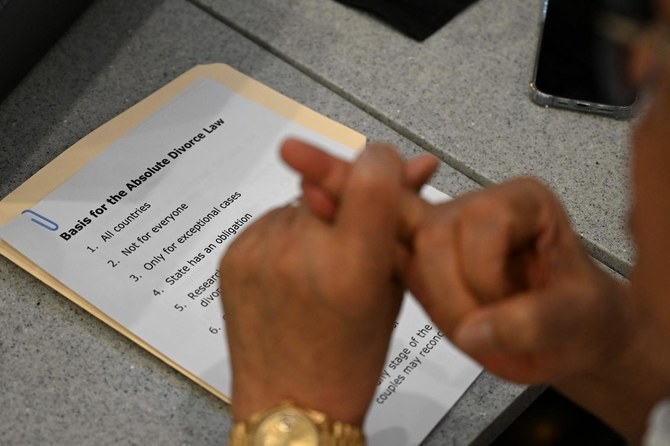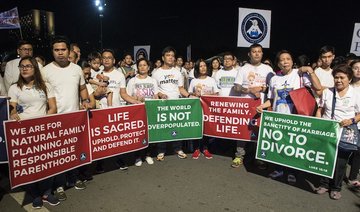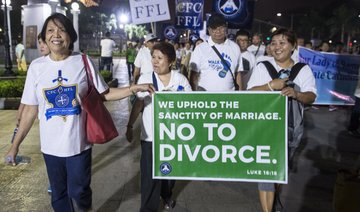MANILA: Philippine mother-of-three Stella Sibonga is desperate to end a marriage she never wanted. But divorce in the Catholic-majority country is illegal, and a court annulment takes years.
The Philippines is the only place outside the Vatican where divorce is outlawed, with the Catholic Church — which holds great influence on Philippine society — opposing the practice as against its teachings.
Those in favor of legalizing divorce say the ban makes it difficult to escape violent or otherwise abusive spouses, or even for couples to amicably cut ties.
People wanting to end their marriage can ask a court for an annulment or a declaration that the nuptials were invalid from the start, but the government can appeal against those decisions.
The legal process is slow and expensive — cases can cost as much as $10,000 or more in a country plagued by poverty — with no guarantee of success, and some people seeking a faster result fall for online scams.
“I don’t understand why it has to be this difficult,” said Sibonga, who has spent 11 years trying to get out of a marriage that her parents forced her into after she became pregnant.
Sibonga’s legal battle began in 2012, when she applied to a court to cancel her marriage on the basis of her husband’s alleged “psychological incapacity,” one of the grounds for terminating a matrimony.
After five years and $3,500 in legal fees, a judge finally agreed. The former domestic worker’s relief was, however, short-lived.
The Office of the Solicitor General, which as the government’s legal representative is tasked with protecting the institution of marriage, successfully appealed the decision in 2019.
Sibonga said she requested the Court of Appeals to reverse its ruling, but is still waiting for an answer.
“Why are we, the ones who experienced suffering, abandonment and abuse, being punished by the law?” said Sibonga, 45, who lives near Manila.
“All we want is to be free.”
The most powerful opponent to divorce in the Philippines is the Catholic Church, which is also against abortion and contraceptives.
Around 78 percent of the country’s 110 million people are Catholic, according to official census data, and many politicians are wary of contradicting the Church on sensitive social issues.
But Congress has scored significant wins in recent years.
A controversial birth control law was passed in 2012, despite strong opposition from the Church.
And in 2018, majority and opposition parties in the House of Representatives approved a divorce bill that later stalled in the Senate. It was the first time such a proposal had got that far.
Surveys conducted by polling company Social Weather Stations show a shift in Philippine attitudes toward divorce.
In 2005, 43 percent of Filipinos supported legalizing divorce “for irreconcilably separated couples,” while 45 percent disagreed.
The same survey in 2017 showed 53 percent in favor, while only 32 percent disagreed.
A group of lawmakers is now leading a fresh push to legalize divorce, with several bills filed in the House and the Senate.
“We are not destroying any marriage,” said Edcel Lagman, a congressman and author of one of the bills.
Lagman said divorce was for “dysfunctional marriages beyond repair” and legalizing it would enable women and their children to escape “intolerant and abusive husbands.”
Before he was elected, President Ferdinand Marcos said the country should consider allowing divorce, but insisted it should not be easy.
The burdensome process for getting a court order to end a marriage has spawned online scams offering to secure a quick ruling without time-consuming court appearances.
AFP fact checkers found numerous Facebook posts spreading false information about the legal process for annulment in order to attract clients, underscoring a growing global trend of fraudsters profiting off disinformation.
One victim said she was charged the equivalent of $2,400 for an annulment service that turned out to be fake.
She is now considering converting to Islam in the hope of securing a divorce under Muslim law.
“I’m really trying every possible option just to be single again,” she said on the condition of anonymity.
“Annulment takes so long, it’s so expensive and it’s not guaranteed, so I’m seeking a more convenient way.”
Family law specialist Katrina Legarda said the number of people falling for bogus services showed there was a “dire need” for new legislation.
But Father Jerome Secillano, of the Catholic Bishops’ Conference of the Philippines, said the nation should be “proud” to be the only country outside the Vatican “holding on to the traditional concept of marriage.”
“There will always be imperfections in a relationship,” he said.
Secillano said divorcing an abusive partner would “perpetuate the violence” because the perpetrator would go on to abuse their next partner.
“You are not actually curing the disease itself,” he said.
Sibonga was raised a Catholic, but stopped attending church to avoid accusations of adultery.
She has a long-term boyfriend, but cannot tie the knot with him until her first marriage is legally terminated.
That her case has dragged on for so long is not unusual in the Philippines, where a creaky justice system can take years to resolve even minor issues.
“People think that because I am still technically married, I’m a sinner,” she said.
“They really believe that what God has united cannot be separated. Really? Even if your husband is trying to kill you, even after everything he’s done, divorce is still not allowed?“
Sibonga said her relationship with her husband had been traumatic and had pushed her to attempt suicide twice.
She does not want her children to marry until divorce is allowed.
“I told them they can cohabitate and have as many children as they want, but I won’t ever consent to them getting married,” she said.
“I just don’t want them to end up like me.”
‘We want to be free’: Filipinos demand right to divorce
https://arab.news/cqdek
‘We want to be free’: Filipinos demand right to divorce

- The Philippines is the only place outside the Vatican where divorce is outlawed
- Legal process can cost as much as $10,000 or more with no guarantee of success
UAE president to visit South Korea

- The two leaders will discuss bilateral ties and explore opportunities for greater collaboration
ABU DHABI: UAE President Mohamed bin Zayed Al-Nahyan will make a two-day state visit to South Korea on May 28 at the invitation of President Yoon Suk Yeol, state news agency WAM reported on Wednesday.
The two leaders will discuss bilateral ties and explore opportunities for greater collaboration across various sectors including trade, investment, energy and technology.
They will also address regional and international developments of common interest.
“The meeting comes within the framework of strategic partnership between the UAE and South Korea in line with their vision to achieve a better and more prosperous future for the countries,” the WAM statement said.
Norway, Ireland and Spain to formally recognize Palestine as a state

- Palestinian Authority and its rival group Hamas both welcomed the recognition
- Israel recalls envoys to Spain, Ireland and Norway for consultations
COPENHAGEN: Norway, Spain and Ireland are formally recognizing Palestine as a state, the countries’ leaders said on Wednesday.
Norwegian Prime Minister Jonas Gahr Store said: “There cannot be peace in the Middle East if there is no recognition.”
Spanish Prime Minister Pedro Sanchez also announced that the country’s council of ministers would recognize an independent Palestinian state on Tuesday May 28.
“Next Tuesday, May 28, Spain’s cabinet will approve the recognition of the Palestinian state,” he said, adding that his Israeli counterpart Benjamin Netanyahu was putting the two state solution in “danger” with his policy of “pain and destruction” in the Gaza Strip.
Irish Prime Minister Simon Harris said it was a move coordinated with Spain and Norway, “an historic and important day for Ireland and for Palestine.”
The Palestinian Authority and its rival group Hamas both welcomed the recognition of a Palestinian state by Ireland, Spain and Norway.
The Palestinian Authority exercises limited self-rule in the West Bank territory while Hamas runs Gaza.
Several European Union countries have in the past weeks indicated that they plan to make the recognition, arguing a two-state solution is essential for lasting peace in the region.
Israel recalled envoys to Spain, Ireland and Norway over their moves to recognize a Palestinian state.
“Today, I am sending a sharp message to Ireland and Norway: Israel will not go over this in silence. I have just ordered the return of the Israeli ambassadors from Dublin and Oslo to Israel for further consultations in Jerusalem,” Foreign Minister Israel Katz said in a statement.
Sanchez said in March that Spain and Ireland, along with Slovenia and Malta, had agreed to take their first steps toward Palestinian recognition, seeing a two-state solution as essential for lasting peace.
The efforts come as a mounting death toll in Gaza from Israel’s offensive to rout Hamas prompts calls globally for a ceasefire and lasting solution for peace in the region.
Norway, which is not a member of the European Union but mirror its moves, has been an ardent supporter of a two-state solution between Israel and the Palestinians.
“The terror has been committed by Hamas and militant groups who are not supporters of a two-state solution and the state of Israel,” the Norwegian government leader said.
“Palestine has a fundamental right to an independent state,” Gahr Store told a press conference.
The move comes as Israeli forces have led assaults on the northern and southern edges of the Gaza Strip in May, causing a new exodus of hundreds of thousands of people, and sharply restricted the flow of aid, raising the risk of famine.
The Scandinavian country “will therefore regard Palestine as an independent state with all the rights and obligations that entails,” Gahr Store said.
Norway’s recognition of a Palestine state comes more than 30 years after the first Oslo agreement was signed in 1993.
Since then, “the Palestinians have taken important steps toward a two-state solution,” the Norwegian government said.
It said that the World Bank determined that Palestine had met key criteria to function as a state in 2011, that national institutions have been built up to provide the population with important services.
“The war in Gaza and the constant expansion of illegal settlements in the West Bank still mean that the situation in Palestine is more difficult than it has been in decades,” the Norwegian government said.
China to continue to strengthen ties with Iran, state media says

- “Iran has lost outstanding leaders and China has lost good friends and partners, said Wang, according to Xinhua news
BEIJING: China will continue to strengthen strategic cooperation with Iran, safeguard common interests, and make endeavors for regional and world peace, Chinese state media reported on Tuesday, citing comments from Foreign Minister Wang Yi.
Wang made the remarks in talks on Tuesday with Iranian Deputy Foreign Minister Mahdi Safari, while attending a meeting of the Council of Foreign Ministers of the Shanghai Cooperation Organization (SCO).
“Iran has lost outstanding leaders and China has lost good friends and partners, said Wang, according to Xinhua news. “In this difficult time, China firmly stands by Iranian friends,” he said, referring to the death of Iranian President Ebrahim Raisi on Sunday.
Shaken passengers arrive in Singapore after turbulence-hit flight

- The airline said the aircraft was a Boeing 777-300ER with a total of 211 passengers and 18 crew on board
- A 73-year-old British passenger died of a suspected heart attack and at least 30 people were injured
SINGAPORE: More than 140 passengers and crew from a Singapore Airlines flight hit by heavy turbulence that left dozens injured and one dead finally reached Singapore on a relief flight Wednesday morning after an emergency landing in Bangkok.
The scheduled London-Singapore flight on a Boeing 777-300ER plane diverted to Bangkok after the plane was buffeted by turbulence that flung passengers and crew around the cabin, slamming some into the ceiling.
A 73-year-old British passenger died of a suspected heart attack and at least 30 people were injured.
“I saw people from across the aisle going completely horizontal, hitting the ceiling and landing back down in like really awkward positions. People, like, getting massive gashes in the head, concussions,” Dzafran Azmir, a 28-year-old student on board the flight told Reuters after arriving in Singapore.
Photographs from the interior of the plane showed gashes in the overhead cabin panels, oxygen masks and panels hanging from the ceiling and luggage strewn around. A passenger said some people’s heads had slammed into the lights above the seats and punctured the panels.
Singapore Airlines took 131 passengers and 12 crew on the relief flight from Bangkok that reached Singapore just before 5 a.m. (2100 GMT). There were 211 passengers including many Australians, British and Singaporeans, and 18 crew on board the original flight; injured fliers and their families remained in Bangkok.
“On behalf of Singapore Airlines, I would like to express my deepest condolences to the family and loved ones of the deceased,” Singapore Airlines CEO Goh Choon Phong said in a video message.
Singapore’s Transport Safety Investigation Bureau (TSIB) is looking into the incident, and the US National Transportation Safety Board is also sending representatives for support.
The plane encountered sudden extreme turbulence, Goh said, and the pilot then declared a medical emergency and diverted to Bangkok.
Aircraft tracking provider FlightRadar 24 said at around 0749 GMT the flight encountered “a rapid change in vertical rate, consistent with a sudden turbulence event,” based on flight tracking data.
“There were thunderstorms, some severe, in the area at the time,” it said.
The sudden turbulence occurred over the Irrawaddy Basin in Myanmar about 10 hours into the flight, the airline said. Turbulence has many causes, most obviously the unstable weather patterns that trigger storms, but this flight could have been affected by clear air turbulence, which is very difficult to detect.
Turbulence-related airline accidents are the most common type of accident, according to a 2021 NTSB study.
While the airline said 30 people were injured, Samitivej Hospital in Thailand said it was treating 71 passengers.
From 2009 through 2018, the US agency found that turbulence accounted for more than a third of reported airline accidents and most resulted in one or more serious injuries, but no aircraft damage.
Singapore Airlines, which is widely recognized as one of the world’s leading airlines and is a benchmark for much of the industry, has not had any major incidents in recent years.
Its last accident resulting in casualties was a flight from Singapore to Los Angeles via Taipei, where it crashed on Oct. 31, 2000 at the Taiwan Taoyuan International Airport, killing 83 of the 179 people on board.
Over 1 million claims related to toxic exposure granted under new veterans law, Biden announces

- In raw numbers, more than 1 million claims have been granted to veterans since Biden signed the so-called PACT Act into law in August 2022, the administration said Tuesday
NASHUA, N.H.: President Joe Biden, aiming to highlight his legislative accomplishments this election year, traveled to New Hampshire on Tuesday to discuss how he’s helped military veterans get benefits as a result of burn pit or other toxic exposure during their service.
“We can never fully thank you for all the sacrifices you’ve made,” Biden said to the veterans and their families gathered at a YMCA. “In America, we leave no veteran behind. That’s our motto.”
In raw numbers, more than 1 million claims have been granted to veterans since Biden signed the so-called PACT Act into law in August 2022, the administration said Tuesday. That amounts to about 888,000 veterans and survivors in all 50 states who have been able to receive disability benefits under the law.
That totals about $5.7 billion in benefits given to veterans and their survivors, according to the administration.
“The president, I think, has believed now for too long, too many veterans who got sick serving and fighting for our country had to fight the VA for their care, too,” Veterans Affairs Secretary Denis McDonough told reporters on Monday. PACT stands for “Promise to Address Comprehensive Toxics.”
The PACT Act is relatively lower profile compared to the president’s other legislative accomplishments — such as a bipartisan infrastructure law and a sweeping tax, climate and health care package — but it is one that is deeply personal for Biden.
He has blamed burn pits for the brain cancer that killed his son, Beau, who served in Iraq, and has vowed repeatedly that he would get the PACT Act into law. Burn pits are where chemicals, tires, plastics, medical equipment and human waste were disposed of on military bases and were used in Iraq and Afghanistan.
Before the law, the Department of Veterans Affairs denied 70 percent of disability claims that involved burn pit exposure. Now, the law requires the VA to assume that certain respiratory illnesses and cancers were related to burn pit or other toxic exposure without veterans having to prove the link.
Before Biden’s planned remarks, he went to a Veterans of Foreign Wars post in Merrimack, New Hampshire. The president met there with Lisa Clark, an Air Force veteran who is receiving benefits through the PACT Act because her late husband, Senior Master Sergeant Carl Clark, was exposed to the chemical herbicide Agent Orange during the Vietnam War.
Sen. Jon Tester, D-Montana, marked the milestone by praising the veterans who advocated for the law.
“For far too long, our nation failed to honor its promises to our veterans exposed to toxins in military conflicts across the globe— until we fought like hell alongside veterans to finally get the PACT Act signed into law,” Tester, chairman of the Senate Veterans’ Affairs Committee, said.





















